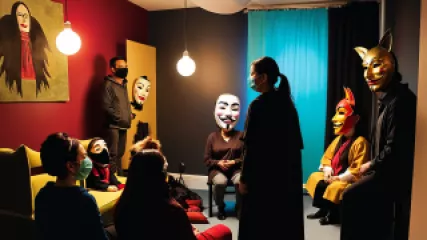Exploring the Impact of Drama Therapy Activities: An Interview with a Drama Therapist
Welcome to this special interview feature where we delve into the incredible world of drama therapy. In this article, we will explore the impact of drama therapy activities and gain insights from a seasoned drama therapist. Drama therapy is a unique and powerful form of therapeutic intervention that utilizes the transformative power of theater and performance to promote personal growth, healing, and self-expression.
The Interview
Today, we have the privilege of speaking with Leonard Morales, a highly experienced drama therapist who has dedicated his career to helping individuals overcome challenges through the medium of drama. Leonard has worked with diverse populations, including children, adolescents, and adults, using drama therapy to address a wide range of psychological and emotional issues.
Q: Can you explain what drama therapy is and how it differs from traditional talk therapy?
A: Drama therapy is an experiential form of therapy that integrates drama and psychology. It engages individuals in various dramatic activities, such as role-playing, improvisation, storytelling, and creative expression, to explore emotions, develop insight, and foster personal growth. Unlike traditional talk therapy, drama therapy encourages clients to embody their thoughts and feelings through theatrical techniques, allowing for a deeper exploration and understanding of their inner world.
Q: What are some common goals of drama therapy?
A: Drama therapy can be used to achieve a wide range of therapeutic goals. Some common objectives include enhancing self-awareness, building self-esteem, improving communication skills, fostering empathy and social skills, managing anxiety and stress, resolving trauma, and promoting overall emotional well-being. Drama therapy offers a safe and supportive environment for individuals to explore their emotions, express themselves authentically, and gain new perspectives on their experiences.
Q: How do drama therapy activities help individuals with anxiety?
A: Drama therapy provides a unique platform for individuals with anxiety to explore and manage their symptoms. Through the use of structured exercises and improvisation, drama therapy allows clients to confront and address their anxieties in a controlled and supportive environment. By embodying anxious thoughts and emotions, individuals can develop coping strategies, practice assertiveness, and gain a sense of mastery over their fears. The creative nature of drama therapy activities can also serve as a healthy outlet for emotional release and stress reduction.
Q: Can you provide some examples of drama therapy activities for anxiety?
A: Certainly! Here are a few drama therapy activities that can be helpful for individuals dealing with anxiety:
- Mirror Exercise: In pairs, participants take turns mirroring each other's movements and expressions. This activity promotes attunement, empathy, and non-verbal communication skills, while also encouraging individuals to become more present in the moment.
- Role Reversal: Participants are asked to switch roles with another person in the group and portray their anxieties or fears. This activity allows individuals to gain perspective, develop empathy towards others, and creatively express their own anxieties.
- Puppet Play: Using puppets or stuffed animals, individuals can externalize their anxiety and engage in a dialogue with their fears. This activity provides a safe distance for exploring and processing anxious thoughts and emotions.
- Improvisational Storytelling: Participants collaboratively create a story, taking turns adding new elements or twists. This activity encourages flexibility, spontaneity, and adaptive thinking, which can be valuable skills for managing anxiety.
Q: How does drama therapy benefit children and adolescents?
A: Drama therapy is particularly effective for children and adolescents due to its interactive and engaging nature. It provides a creative outlet for self-expression, emotional exploration, and social skill development. Through drama therapy, children and adolescents can enhance their communication skills, develop empathy, improve self-confidence, and learn healthy ways of managing emotions. The playful and imaginative aspects of drama therapy also make it an enjoyable and non-threatening therapeutic approach for younger populations.
Q: Are there any misconceptions about drama therapy that you would like to address?
A: One common misconception is that drama therapy is only for individuals with a background in theater or performance. In reality, drama therapy is accessible to everyone, regardless of their previous experience or skill level. It is not about achieving professional acting standards but rather about using dramatic techniques as a means of personal growth and exploration. Drama therapy is a collaborative and client-centered approach that can be adapted to meet the unique needs of each individual.
Q: How can individuals access drama therapy?
A: Individuals interested in exploring drama therapy can seek out qualified drama therapists in their area. It is essential to find a therapist who has received proper training in drama therapy and holds the necessary credentials. Drama therapy can be offered in various settings, including private practice, community centers, schools, hospitals, and mental health clinics. Some drama therapists may also offer online drama therapy sessions, making it more accessible to individuals who cannot attend in-person sessions.
Conclusion
Drama therapy is a powerful and transformative therapeutic approach that harnesses the creative potential of theater and performance. Through drama therapy activities, individuals can explore their emotions, gain insight into their experiences, develop valuable coping skills, and promote overall well-being. Whether used to address anxiety, trauma, or other psychological challenges, drama therapy offers a unique and engaging path towards healing and personal growth.
We are grateful to Leonard Morales for sharing his expertise and shedding light on the impact of drama therapy. His insights have provided valuable information for anyone interested in exploring this innovative therapeutic approach.






